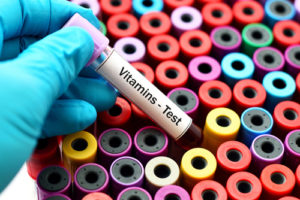 Last week I commented on a news story about vitamin D. Many of you requested more information about supplements and testing, so in this blog I give you my advice.
Last week I commented on a news story about vitamin D. Many of you requested more information about supplements and testing, so in this blog I give you my advice.
What is Vitamin D?
Vitamin D is often to referred to as the sunshine vitamin. This is because our primary source of this vital nutrient comes from the sun’s UVB rays which we convert to vitamin D in our skin.
In recent years, there has been a great deal of news coverage about this important vitamin. It has been widely confirmed that we are not getting enough sun exposure (especially during the winter months) to meet our vitamin D needs.
Vitamin D is involved in a great number of processes in the body and deficiency has been linked to a vast array of conditions including bone problems, infertility, asthma, depression, heart disease, MS, ME and cancer.
This latest news story reported that supplementing with vitamin D can protect us against colds and flu.
Vitamin D can be converted in the body to a very powerful hormone that influences genes involved in the immune system so this would make perfect sense.
It is recognised that in the UK (from October to April) we do not get enough UVB for vitamin D synthesis and therefore have to rely on our tissue stores. The problem here is that due to our use of sunscreens and lack of outdoor activity, we do not store enough vitamin D to get us through the winter months. Even when the sun is shining in winter it does not have the UVB rays that we need.
The most vulnerable include:
- Babies and children
- Pregnant woman
- Those with dark skin
- The elderly
The most effective way of getting enough vitamin D is through the skin from the UVB rays. This produces vitamin D in the form of D3.
It is interesting that the body can handle up to 20,000iu’s which is 20 times the current RDA for adults at 200iu.
Food Sources of Vitamin D
We can obtain some vitamin D from food but only in moderate amounts. The best sources are:
- Oily Fish – a serving can provide between 375iu to 1000iu.
- Eggs – one egg can provide approximately 25iu.
- Mushrooms – a serving of white mushrooms can provide approximately 12iu.
So, you can see that getting enough just from food is going to be hard.
The best way is to have frequent exposure to sunlight without sunscreen and as much of the body exposed as possible! Ideally, we need to be exposing 1/3rd of our skin to the sun for 15 minutes a day but please do not burn your skin.
Vitamin D and Conditions
Bone Conditions
Vitamin D is needed to aid calcium absorption.
Asthma & Allergies
Vitamin D deficiency has been related to a higher incidence of childhood asthma and allergies. Vitamin D reduces the body’s allergic response.
Pregnancy & Fertility
Vitamin deficiency is potentially associated with fertility issues. Vitamin D acts as an immune regulator and is vital for the success of fertilisation.
In pregnancy, deficiency is linked with preeclampsia, insulin resistance and gestational diabetes.
Crohn’s Disease & Colitis
Vitamin D is involved in the expression of a gene which signals the invasion of microbes in the intestines. Deficiency therefore prevents the immune system from identifying and dealing with this bacteria.
MS & Parkinson’s
Vitamin D is involved in the expression of a gene that are involved in both MS & Parkinson’s disease.
Dementia
Studies have shown a correlation between vitamin D levels and cognitive function.
Mental Health
There have been many studies looking at the link between vitamin D deficiency and a whole spectrum of mental health issues.
Heart Disease
Vitamin D appears to inhibit the uptake of cholesterol in the arteries and is thought to play a significant role in heart health.
Diabetes
Vitamin D has the ability to lower and improve insulin resistance.
Since vitamin D is linked with over 200 gene expressions it is expected that research will identify an association with many diseases.
Testing
It is really easy to test for vitamin D. There are many private tests available. I can recommend this test from Cambridge Nutritional Sciences.
This test costs £40.80 and is suitable for children over 2 years and adults. If you are interested in this test and would like a discount code, please email me at: julie@julieclarknutrition.co.uk
Supplements
The RDA (recommended daily allowance) is set at 400iu or 10 mcg for children and adults.
The safe upper limit is set at 1000iu or 25mcg.
However, those with vitamin D deficiency can be treated with doses up to 10,000iu.
As of July 2016, the Government recommended that the entire population take a vitamin D supplement. You can read the report and advice here.
Important: if your baby is on formula milk you do not need to supplement with vitamin D as it is added to the formula. If you or your child are taking a multi vitamin, please check the vitamin D allowance.
My recommended supplements:
For breast fed babies: Biocare Baby Vitamin D drops
For children 6months to 5 years: Better You DLux Infant
For children over 5 years: Better You DLux Junior
For adults:
If you would like to receive a discount code for any of these products, please email me on julie@julieclarknutrition.co.uk
I really hope that information has helped. For more help and advice please be sure to like my page here.
2 responses to “Vitamin D – Does your child or baby need a supplement?”
-
Great and informative post thank you. Please make the distinction between type 1 and 2 diabetes though as they are very different conditions. T1 is auto immune, t2 can be controlled by diet / lifestyle.
-
The studies have looked at both type 1 & type 2 and have found that vitamin D does play a role in both types.
-


Leave a Comment